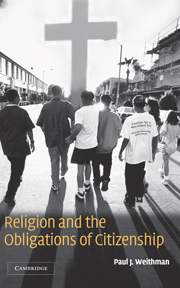Book contents
- Frontmatter
- Contents
- Preface and acknowledgments
- Introduction
- 1 Participation, full participation and realized citizenship
- 2 Religion's role in promoting democracy
- 3 Conceptions of the democratic citizen
- 4 Public argument
- 5 The principles
- 6 Robert Audi on secular reasons
- 7 John Rawls on public reason
- Conclusion
- Select bibliography
- Index
3 - Conceptions of the democratic citizen
Published online by Cambridge University Press: 22 September 2009
- Frontmatter
- Contents
- Preface and acknowledgments
- Introduction
- 1 Participation, full participation and realized citizenship
- 2 Religion's role in promoting democracy
- 3 Conceptions of the democratic citizen
- 4 Public argument
- 5 The principles
- 6 Robert Audi on secular reasons
- 7 John Rawls on public reason
- Conclusion
- Select bibliography
- Index
Summary
In the previous chapter I adduced evidence that churches perform a number of activities which contribute to the democratic character of American politics. These activities foster or consist in just the forms of religiously motivated political behavior and religious political argument which some philosophers think should be subject to moral restrictions. The observance of such restrictions is typically said to promote liberal democratic values. I suggested that this claim needs to be rethought in light of the conditions that produce this behavior and argument, and the contributions churches make to democracy. This suggestion can be made good only by identifying the features of political processes that make them democratic. The suggestion also seems to depend upon the claim that political processes can be more or less democratic in character. In what follows I shall assume that this is so. I shall assume, that is, that “democratic” is a degree concept and that political processes can be more or less democratic. The degree to which they are so will then depend in some way upon how they exhibit and combine what might be called their “democracy-conducing” features.
This last conclusion points to a host of complex and intriguing philosophical questions. It could be, at least in theory, that there is no limit to the degree to which political processes can be or become democratic.
- Type
- Chapter
- Information
- Religion and the Obligations of Citizenship , pp. 67 - 92Publisher: Cambridge University PressPrint publication year: 2002



